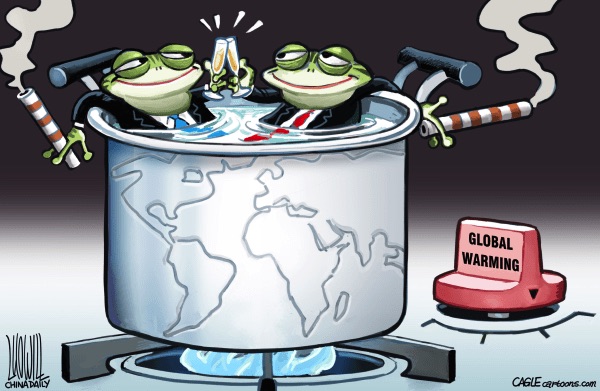As COVID-19 halts economies, yields immeasurable loss of life and prompts legislation that keeps people home, it has thus been hailed as the most pressing threat we face. However, we are not seeing the forest for the trees. Doomsday media coupled with a skyrocketing death toll reinforce the immediacy of the issue, but the tangibility of COVID-19 is overshadowing the looming existential threat of climate change, an issue that has much higher potential for complete and utter global devastation.
As of recently, the global death toll associated with the pandemic is just shy of 75,000. Most worrisome is lack of testing and how quickly the virus spreads due to its respiratory droplet and aerosol transmission. Politicians flounder as hospitals approach max capacity and protective equipment for health-care personnel dwindles. Stay-at-home orders have been issued across the United States, and law abiding citizens are left at home, facing the repercussions of the pandemic mentally, physically and financially. While optimistic estimates claim that we can secure a vaccine in a year’s time, our economy and its citizens are being crushed under the weight of uncertainty.
Even in the most tragic of times, however, a silver lining ultimately prevails. As roads empty and people sequester themselves, the machine of capitalism has slowed dramatically, prompting environmental healing. Viral articles detail miracles such as the vacancy of boat traffic in Venice that has prompted dolphins and swans to make an appearance. Though some of these articles have since been debunked, scientific data and satellites reinforce that COVID-19 has had a positive environmental impact. In densely populated cities such as Los Angeles, Seattle, and New York, satellite imagery shows a major decrease in emissions.
As people share these feel-good articles on social media and the like, the greater ramifications of these phenomena are still lost on many. This global pause has served as proof that we do, in fact, have the capacity to halt industries and disastrous environmental practices. While many are eager to return to what they deem as ordinary life, the fact of the matter is, our current practices are unsustainable at every level.
As we flatten the curve and society returns to some semblance of normalcy, my hope is that this catastrophe helps us redefine a different future. COVID-19 is a reminder that whether it’s a pandemic or broad sweeping anthropogenic climate change, humans are not immune to catastrophe in the many forms it may assume. Going back to the way things were, when possible, will be transitioning from one death sentence to another, even if it’s a less obvious one.
While many Americans, as well as people across the globe, maintain a singular focus on the pandemic, the prominent threat of climate change is being overlooked. A study by the Lancet medical journal predicts that 500,000 people will die directly of climate change by 2050, which is roughly seven times the current coronavirus death toll. Unlike COVID-19 where testing can definitively confirm the cause of death, the all-encompassing nature of climate change makes it difficult to directly link climate phenomena with climate change and the resulting casualties. In other words, that’s just the tip of the iceberg.
Today’s worry of viruses and ventilators is tomorrow’s unbreathable air. Just recently, the Trump administration reduced fuel efficiency standards previously set in place. As automakers rejoice as they narrowly avoid the undertaking of ambitious gas mileage and emissions requirements, our atmosphere is predicted to assume 900 million more tons of carbon dioxide due to this environmental rollback. Though this health crisis is spurring positive environmental changes, this is only a temporary solution to a permanent problem. Public health is paramount, as the response to COVID-19 has indicated. Why treat climate change any differently?




